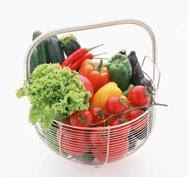 Traditional vegetable gardens require an enormous amount of hard work and attention - weeding, feeding and strict planting schedules. There is also the problem of seasonality, allowing beds to rest during the cooler months producing nothing at all.
Traditional vegetable gardens require an enormous amount of hard work and attention - weeding, feeding and strict planting schedules. There is also the problem of seasonality, allowing beds to rest during the cooler months producing nothing at all.Then we are told to plant green manure crops, add inorganic fertilizers and chemicals to adjust imbalanced soils. It takes a lot of time, dedication and a year-round commitment to grow your own food the traditional way. But does growing vegetables really need to be that difficult?
Let me ask you this question. Does a forest need to think how to grow? Does its soil need to be turned every season? Does someone come along every so often and plant seeds or take pH tests? Does it get weeded or sprayed with toxic chemicals? Of course not!
However this is the way most gardeners do. For instance, let’s take a look at a common traditional gardening practice and I will show you how a single problem can escalate into a whole host of problems.
Imagine a traditional vegetable garden, planted with rows of various vegetables. There are fairly large bare patches between the vegetables. To a traditional gardener, a bare patch is just a bare patch. But to an ecologist, a bare patch is an empty niche space. An empty niche space is simply an invitation for new life forms to take up residency. That’s what a weed is in ecological terms - a niche space filler. Weeds are very good colonizing plants. If they weren’t, they wouldn’t be called weeds.
Now back to our story. Weeds will grow in the empty niche spaces. Quite often there are too many weeds to pick out individually, so the traditional gardener uses a hoe to turn them into the soil. I have read in many gardening books, even organic gardening books, that your hoe is your best friend. So the message we are getting is that using a hoe is the solution to a problem.
However, I would like to show you how using a hoe actually creates a new set of problems. Firstly, turning soil excites weed seeds, creating a new explosion of weeds. And secondly, turning soil upsets the soil ecology. The top layer of soil is generally dry and structureless. By turning it, you are placing deeper structured soil on the surface and putting the structureless soil underneath. Over time, the band of structureless soil widens. Structureless soil has far less moisture holding capacity, so the garden now needs more water to keep the plants alive.
Fortunately, there is a solution! We must use a technique that combines pest ecology, plant ecology, soil ecology and crop management into a method that addresses the causes of these problems.
Jonathan White, an environmental scientist has been testing an ecologically-based method of growing vegetables and food for several years. This method uses zero tillage, zero chemicals, has minimal weeds and requires a fraction of the physical attention (when compared to traditional vegetable gardening). It also produces several times more, per given area, and provides food every single day of the year.
I have no doubt that this is the way we will be growing vegetables and food in the future. It’s just commonsense. Why wouldn’t we use a method that produces many times more food with a fraction of the effort? I know it will take a little while to convince people that growing vegetables is actually very instinctual and straightforward, but with persistence and proper explanation, people will embrace this method.
Why? Because sanity always prevails…
…eventually!

Click Here to discover Jonathan's gardening method
Marine VHF


Aucun commentaire:
Enregistrer un commentaire